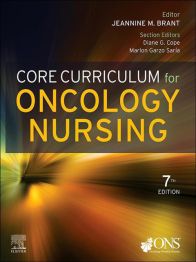New to this edition
- NEW! Updated content throughout reflects the 2022 OCN® Examination blueprint, along with the latest national and international guidelines and the most current research evidence.
- NEW! A Myelofibrosis chapter is added to address this important cancer type, and a Social Determinants of Health and Financial Toxicity chapter addresses the cost of cancer treatment and financial burden of cancer treatment on patients and families.
- NEW! COVID-19–related content reflects the impact of the ongoing pandemic, including differential diagnoses for pulmonary symptoms and the impact of delayed cancer diagnosis and treatment.
- NEW! Updated emphases mirror those of the American Association of Colleges of Nursing 2021 Essentials as well as the recommendations of the 2020-2030 Future of Nursing report.
Author Information
Edited by Oncology Nursing Society; Jeannine M. Brant, PhD, APRN, AOCN, FAAN, Oncology Nurse Specialist, Director and Lead Scientist, Collaborative Science and Innovation, Billings Clinic, Billings, Montana; Diane G. Cope, PhD, APRN, BC, AOCNP®, Director of Nursing, Oncology Nurse Practitioner, Florida Cancer Specialists and Research Institute, Fort Myers, Florida; Marlon Garzo Saría, PhD, RN, AOCNS®, FAAN, Tarble Foundation Oncology Clinical Nurse Specialist and Nurse Scientist, Providence Saint John’s Health Center, Santa Monica, California; Assistant Professor, John Wayne Cancer Institute/Pacific Neuroscience Institute, Santa Monica, California and Clinical Nurse, United States Air Force
PART 1: The Care Continuum
1. Epidemiology, Prevention, and Health Promotion
2. Screening and Early Detection
3. Survivorship
4. Palliative and End-of-Life Care
5. Nurse Navigation Across the Cancer Continuum
6. Communication and Shared Decision-Making
PART 2: Scientific Basis for Practice
7. Carcinogenesis
8. Immunology
9. Precision Medicine
10. Genetic Risk Factors
11. Research Protocols and Clinical Trials
PART 3: Site-Specific Cancer Considerations
12. Bone and Soft Tissue Cancers
13. Breast Cancer
14. Gastrointestinal Cancers
15. Genitourinary Cancers
16. Head and Neck Cancers
17. Infection Related Cancers
18. Leukemia
19. Lung Cancer
20. Lymphoma
21. Multiple Myeloma
22. Myelofibrosis NEW!
23. Neurologic System Cancers
24. Reproductive System Cancers
25. Skin Cancer
PART 4: Treatment Modalities
26. Surgery
27. Hematopoietic Stem Cell Transplantation and CAR-T Cell Therapy
28. Radiation Therapy
29. Chemotherapy, Hormonal Therapy, and Oral Adherence
30. Biotherapies: Targeted Therapies and Immunotherapies
31. Support Therapies and Vascular Access Devices
32. Pharmacologic Interventions
33. Complimentary and Integrative Modalities
PART 5: Palliation of Symptoms
34. Cardiovascular Symptoms
35. Cognitive Symptoms
36. Endocrine Symptoms
37. Fatigue
38. Gastrointestinal Symptoms
39. Genitourinary Symptoms
40. Hematologic and Immune Symptoms
41. Integumentary Symptoms
42. Musculoskeletal Symptoms
43. Neurological Symptoms
44. Nutritional Issues
45. Pain
46. Respiratory Symptoms
47. Sleep Disturbances
PART 6: Oncologic Emergencies
48. Metabolic Emergencies
49. Structural Emergencies
PART 7: Psychological, Social, Cultural, and Spiritual Dimensions of Care
50. Body Image Considerations
51. Caregiver Burden
52. Social Determinants of Health and Financial Toxicity NEW!
53. Cultural and Spiritual Care
54. Psychosocial Disturbances and Coping
55. Sexuality and Sexual Dysfunction
PART 8: Professional Practice
56. Standards of Practice and Professional Performances
57. Evidence-Based Practice
58. Principles of Education and Learning
59. Legal Issues
60. Ethical Issues
61. Professional Issues
62. Compassion Fatigue
Index


